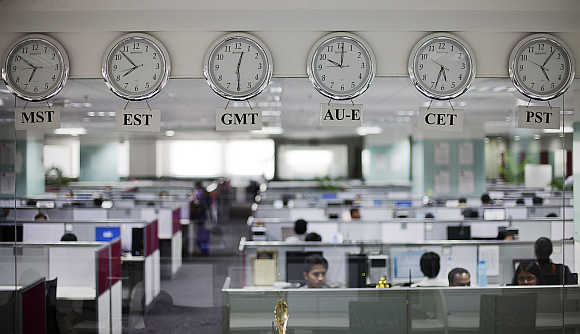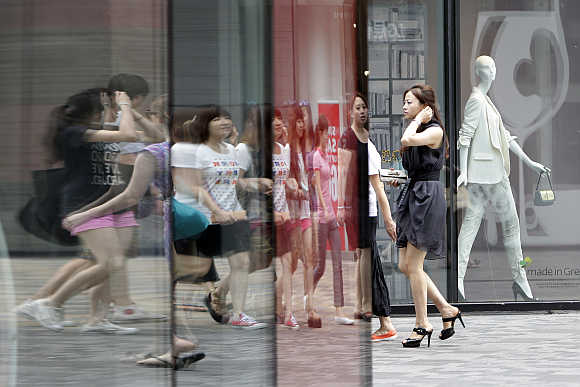 | « Back to article | Print this article |
'Fear that FDI will hurt small shops is misguided'
Poverty rate has fallen from 60 per cent in 1980s to less than 30 per cent today thanks to economic reforms, says Devashish Mitra, Professor of Economics and Gerald B and Daphna Cramer Professor of Global Affairs, the Maxwell School of Citizenship and Public Affairs, Syracuse University, New York.
Mitra says labour laws in the country make it very difficult for companies employing more than a hundred workers to fire employees.
Some of the opposition parties have an ideology that has not changed over time, he tells Faisal Kidwai in an email interview.
Here are the excerpts:
Your areas of research include international trade. What are some of the major problems India faces when it comes to international trade?
The main problem is the small size of India's manufacturing sector relative to the size of its economy. Given that India is a labour-abundant country, its comparative advantage should be in labour-intensive manufacturing.
Click NEXT to read more...
'Fear that FDI will hurt small shops is misguided'
However, the labour regulations in India make it very difficult for firms employing more than a hundred workers to fire employees. The employer knows that it is going to be very difficult to fire any employee even if he/she turns out to be incompetent or if the firm experiences a loss in demand for its product.
Because of this risk, the firm would be reluctant to hire that worker in the first place. As a result, the relatively large Indian manufacturing firms use techniques of production that are way more capital intensive than used in other countries that are at the same stage of development or are have comparable labor abundance.
These laws also mean that manufacturing employment overall expands mainly in small enterprises for whom labour regulations don't apply. Thus India is not able to specialise according to its natural comparative advantage. In addition, road quality and density and long-distance transport are real problems.
Thus, the interior urban as well as rural areas are not well connected to ports. This prevents people living in the interior regions from reaping the benefits of trade. Finally, there is not much of trade facilitation going on in India. In other words, Indian producers need to find foreign markets and then promote their products in those markets.
There does not seem to be much of a system in place that facilitates this.
Click NEXT to read more...
'Fear that FDI will hurt small shops is misguided'
What has been the impact of India's trade reforms on labour-market?
On this subject I have done research with several collaborators. We find that workers are getting a bigger slice of the output they produce in the relatively smaller firms (even though their share might be going down in the relatively large firms) as a result of trade liberalisation.
We also find that trade reforms have certainly not led to an increase in unemployment. In many cases, they have led to a reduction in unemployment. In addition, trade reforms have resulted in Indian manufacturing workers getting a bigger share of the risks and returns (benefits from growth) relative to their employers.
Finally, we find that poverty reduction is associated with trade liberalisation. The poverty rate has fallen from around 60 per cent in the early 1980s to less than 30 per cent today. India has not seen the success China has had in poverty reduction, but then China started its liberalisation process in the late 1970s, while India started in the early 1990s.
There is a lot of resistance to foreign direct investment in retail and aviation. Do you think the resistance is justified?
For an economist who wants the Indian economy to grow and poverty to decline, this resistance is absolutely meaningless.
Click NEXT to read more...
'Fear that FDI will hurt small shops is misguided'
Some of the opposition parties have an ideology that has not changed over time. In fact their ideology seems not to have evolved at all in response to the success we have had with economic reforms in the last two decades. There are other opposition parties that seem to care about their narrow group of constituents (their voting blocks), namely in some cases the owners of small shops.
I, however, think that even the fear, that local small shops are going to be adversely affected by FDI in multi-brand retail, is misguided. And sometimes it seems that the opposition just does not want the ruling party to succeed at doing anything good, in some cases where the opposition probably would have gone in for the same reforms had it been in power.
I think we need these FDI flows. Empirically, FDI and growth are positively associated. While India has grown fast, growth has not been as high and sustained as in the case of China, into which FDI flows annually are about eight times the size of the flows into India.
Also, FDI in retail will bring in better cold storage, transportation and distribution networks and will benefit both farmers and urban consumers, paying a higher price to the former and charging the latter a lower price.
Click NEXT to read more...
'Fear that FDI will hurt small shops is misguided'
The middlemen that exploit farmers will be eliminated. And finally FDI in multi-brand retail has the potential to create a lot of employment, just like it has done in China. Regarding India's declining aviation industry, it needs some stimulus and FDI could deliver it.
Some say the reform policies followed by the present government have increased income inequality and economic conditions of poor haven't really improved. What's your view?
Income inequality has gone up. However, what is important is that poverty actually has gone down quite a bit over the last two to three decades. That is what we should care about most in a poor country. It's estimated that 400 million are below the poverty line in India. What should be done to bridge this income inequality gap?
Yes, there are 350 million to 400 million people below the poverty line in India, depending on which estimate you are using. However, let me reiterate that the proportion of people in the overall population below the poverty line has been going down.
In other words, there is a lot of poverty but it is declining and that is happening because growth is trickling down and pulling people over the poverty line. If we did not have the reforms we have had since the late 1990s, poverty would have been much higher. Our ultimate goal should be getting rid of poverty.
However, we are not there yet since the initial situation was very bad. As a result, eliminating poverty will take time. But there is no doubt that we are moving in that direction.




